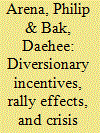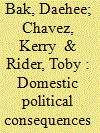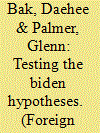| Srl | Item |
| 1 |
ID:
137719


|
|
|
|
|
| Summary/Abstract |
We do not yet have strong evidence that the rally effect motivates domestically vulnerable leaders to become engaged in international conflict. We draw upon mechanism design to argue that, if anything, diversionary incentives should be associated with a greater likelihood of being the target of disputes, though the conditions under which the result obtains are restrictive. Our analysis of all dyad-months involving the United States and its rivals for the period from 1956–1996 yields suggestive evidence of the unconventional behavior anticipated by our model, while failing to find evidence of patterns anticipated by either traditional diversionary accounts or strategic conflict avoidance. These results suggest that if we are to better understand international conflict by focusing on diversionary incentives, which may not be very useful, we should focus on the behavior described by our formal model rather than that anticipated by either traditional diversionary accounts or strategic conflict avoidance.
|
|
|
|
|
|
|
|
|
|
|
|
|
|
|
|
| 2 |
ID:
172338


|
|
|
|
|
| Summary/Abstract |
Given the conventional claim that external threats increase internal cohesion and government capacity, cross-country studies have examined how interstate conflict events influence domestic politics. This article reevaluates the in-group and out-group mechanisms by examining how international strategic rivalry, which indicates the presence of persistent external threats even in the absence of military conflict, affects domestic political competition. An alternative explanation suggests that the effect of external threats on political incentives of domestic actors differs between regime supporters and oppositions. We posit that the presence of international threats from rival states inflames domestic unrest and oppositions’ antiregime challenges, while making governments rely more on repressive tactics given resource constraints and a high level of domestic political intolerance. In addition, we propose that the domestic consequences of international rivalry are heterogeneous depending on the characteristics of political systems and the level of threat perception. Empirical tests reveal robust evidence for the hypotheses.
|
|
|
|
|
|
|
|
|
|
|
|
|
|
|
|
| 3 |
ID:
098252


|
|
|
|
|
| Publication |
2010.
|
| Summary/Abstract |
Senator Joseph R. Biden Jr. predicted that Barack Obama would face an international challenge in his early term by foreign enemies who want to test a young leader's resolve as a chief executive just like John F. Kennedy did in the Cuban missile crisis in 1962. We test this argument using the directed-leader-dyad-period data for both world leaders and the US presidents between 1875 and 2001. We find that old leaders are more likely to be a target of militarized disputes, and even more so during the early term as opposed to Biden's prediction. The impact of tenure on the likelihood of being targeted largely depends on age. We also find that old Republican US presidents are especially vulnerable to foreign challenges early in their term.
|
|
|
|
|
|
|
|
|
|
|
|
|
|
|
|